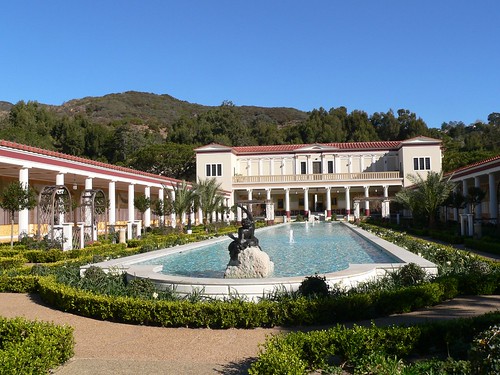We were traveling along the Oaxaca coast in Mexico (more about which later). But by Friday, we were en route to home, via a stop in LA.
Because when we booked the trip last fall, the American Airlines lady said the only way we could do it on frequent flyer miles was to stop over in LA.

Were we willing to do so, she asked?
Oh darn it, I said, I guess this means we finally have to see the Getty Museum (which includes the Villa in Malibu, built in the style of a sumptuous home of classical Rome, to house J. Paul
 Getty's enormous classical art collection). ;-)
Getty's enormous classical art collection). ;-)Drat, added Michael, and the Watts Towers too. :-)
 Poor pitiful us, we agreed, we'll just have to stay somewhere with an ocean view, perhaps near the boardwalk in Venice. ;-)
Poor pitiful us, we agreed, we'll just have to stay somewhere with an ocean view, perhaps near the boardwalk in Venice. ;-)(I hope the sprinkling of sunny images and little winky smiley emoticon things indicates just how pissed off we were to have to make this 2-day stopover. ;-) )
And in any case, I suppose that it's not so strange that while seeing wonders ancient and recent in LA that I lost bearings of my blogging schedule -- even as I was occasionally logging into this blog, and even as I was pondering (as is often the case, since she blogs before me, and since her posts are always rich and thought-provoking) Amanda Elyot's post about Great Britain's Prince Harry.
Of course I can't speak for Amanda's intentions. But the reason the topic fascinated me was that it reminded me of my own confusions and ambivalence about writing romance fiction -- which of course by general definition includes a certain amount of having-it-all fantasy, and in my specific case means that my main characters are often as not of the upper classes of Regency England (The clothes! the clubs! the estates, the carriages! The pleasures, in short, of privilege.)
And yet, by just about anybody's standards, I'm deeply egalitarian in my attitudes toward social, political, and economic matters. And apt to be particularly offended by upperclass twits (in England or -- not to mention names -- anywhere else).
So why do I write in a genre that centers itself upon the pleasures and pursuits of the Regency ton?
The answer, best as I can fathom it, is that I (or at least, god help me, my inner eleven-year-old) am genuinely enthralled by one of the romance genre's deepest messages and fantasies -- of a natural aristocracy of talent and virtue. Which phrase is an oxymoron if there ever was one, but in some ways I think that the fact that natural aristocracy even exists as a familiar string of words is something of a tipoff to what's going on here.
Despite myself almost, I seem to find something deeply satisfying in the belief in a kind of correspondence between outer rewards and inner virtues: the vision of a "true" nobility tested by adversity; of goodness of spirit adorned with the rewards of the earthly life.
The part of ourselves that likes to think of our selves this way, combined with the genuine anthropological complexity of upperclass entitlement seems like endlessly fertile ground for the sort of "fables of identity" many of us hoydens write. (I've borrowed the phrase from the literary critic Northrop Frye.)
 Even given the strength of the mythology, though, I sometimes try to complicate matters in my work. To give the servants inner lives, for example; or in my most recent book, The Edge of Impropriety, to show that the very origins of our Regency fiction (the society novels of the Regency era itself) were often the work of strivers and arrivistes, who needed the myth of natural aristocracy more than anyone, and toward whom I try to be compassionate. (For a fascinating discussion of society novelist and consummate striver Benjamin Disraeli -- who makes a cameo appearance in Edge, check this out, from yesterday's New York Times Book Review).
Even given the strength of the mythology, though, I sometimes try to complicate matters in my work. To give the servants inner lives, for example; or in my most recent book, The Edge of Impropriety, to show that the very origins of our Regency fiction (the society novels of the Regency era itself) were often the work of strivers and arrivistes, who needed the myth of natural aristocracy more than anyone, and toward whom I try to be compassionate. (For a fascinating discussion of society novelist and consummate striver Benjamin Disraeli -- who makes a cameo appearance in Edge, check this out, from yesterday's New York Times Book Review).And finally to note that during changing history (and in another venerable phrase) the last can sometimes come to be first. Which is part of the romantic mythology as well.

And how am I going to connect this to my Mexico trip? Only to offer some worthy writer a terrific romance venue -- the places along the Oaxaca coast, like Lake Chacahua, where slave ships were sometimes wrecked, and where survivers hid in the mangroves and founded communities that endure to this day. And where you just might have to stay, in a hut built of dried palm leaves, as we did, to do some (oh darn) research.
And I'd love to know from you hoydens and other writers how you deal with class inequity and moral value in your historical romances or historical writers.
And how you readers (who might also be writers) negotiate these complex mythologies and what you get from them.
No comments:
Post a Comment